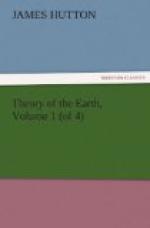We do not now inquire into the nature of those powers, or investigate the laws of light and heat, of cold and condemnation, by which the various purposes of this world are accomplished; we are only to mention those effects which are made sensible to the common understanding of mankind, and which necessarily imply a power that is employed. Thus, it is by the operation of those powers that the varieties of season in spring and autumn are obtained, that we are blessed with the vicissitudes of summer’s heat and winter’s cold, and that we possess the benefit of artificial light and culinary fire.
We are thus bountifully provided with the necessaries of life; we are supplied with things conducive to the growth and preservation of our animal nature, and with fit subjects to employ and to nourish our intellectual powers.
There are other actuating powers employed in the operations of this globe, which we are little more than able to enumerate; such are those of electricity, magnetism, and subterraneous heat or mineral fire.
Powers of such magnitude or force, are not to be supposed useless in a machine contrived surely not without wisdom; but they are mentioned here chiefly on account of their general effect; and it is sufficient to have named powers, of which the actual existence is well known, but of which the proper use in the constitution of the world is still obscure. The laws of electricity and magnetism have been well examined by philosophers; but the purposes of those powers in the economy of the globe have not been discovered. Subterraneous fire, again, although the most conspicuous in the operations of this world, and often examined by philosophers, is a power which has been still less understood, whether with regard to its efficient or final cause. It has hitherto appeared more like the accident of natural things, than the inherent property of the mineral region. It is in this last light, however, that I wish to exhibit it, as a great power acting a material part in the operations of the globe, and as an essential part in the constitution of this world.
We have thus surveyed the machine in general, with those moving powers, by which its operations, diversified almost ad infinitum, are performed. Let us now confine our view, more particularly, to that part of the machine on which we dwell, that so we may consider the natural consequences of those operations which, being within our view, we are better qualified to examine.
This subject is important to the human race, to the possessor of this world, to the intelligent being Man, who foresees events to come, and who, in contemplating his future interest, is led to inquire concerning causes, in order that he may judge of events which otherwise he could not know.
If, in pursuing this object, we employ our skill in research, not in forming vain conjectures; and if data are to be found, on which Science may form just conclusions, we should not long remain in ignorance with respect to the natural history of this earth, a subject on which hitherto opinion only, and not evidence, has decided: For in no subject, perhaps, is there naturally less defect of evidence, although philosophers, led by prejudice, or misguided by false theory, may have neglected to employ that light by which they should have seen the system of this world.




